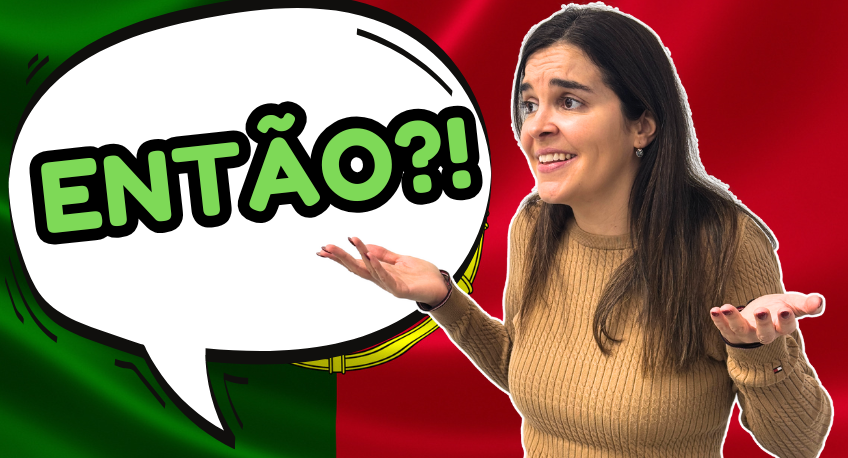Today, I’m going to show you why the word então is so essential in Portuguese and how you can use it like a true native. I’ll reveal everything from the most common to the more subtle uses that make all the difference in our language.
Ready?
Then… let’s get to it!
You can also watch this topic on my YouTube Channel:
Então as a Temporal Adverb
First, we have the use of então as a temporal adverb. Here, então doesn’t act as a conjunction but rather as a temporal marker that links one action to a previous one.
For example:
- O Nuno chegou ao trabalho. Preparou-se, então, para a reunião que tinha marcado. – (Nuno arrived at work. He then got ready for the meeting he had scheduled.)
- Here, então refers to the time between one action and the next, serving as a starting point for the following action. It links to the verb group without directly connecting two clauses. In this sense, então creates a temporal reference, acting as a sort of “bridge” between events.
Então as an Argumentative Connector
Now, então can also be used as a connector, similar to portanto (“therefore”) in Portuguese. This usage is common in sentences where então brings a conclusion or consequence with an argumentative value.
For example:
- A Rita adora dançar, então vai ao ballet todos os dias. – (Rita loves dancing, so she goes to ballet every day.)
- Here, então links the fact that Rita loves dancing to her decision to go to ballet every day. In other words, the second fact is a natural conclusion from the first, with então acting as a cause-and-effect connector. In this case, então could be replaced by portanto or por isso.
Like this:
A Rita adora dançar, portanto vai ao ballet todos os dias. – (Rita loves dancing, therefore she goes to ballet every day.)
Or:
A Rita adora dançar, por isso vai ao ballet todos os dias. – (Rita loves dancing, so she goes to ballet every day.)
Então in Conditional Sentences
Another interesting use of então is in conditional sentences, where it acts as a type of conjunction.
For example:
- Se queres ser o melhor da turma, então tens de estudar mais. – (If you want to be the best in the class, then you have to study harder.)
- Here, então introduces a necessary condition for what was previously mentioned. It emphasizes the relationship between the condition and the result, reinforcing that something depends on fulfilling that condition.
Então in Everyday Language and as a Filler
Finally, we have the everyday use of então as a more relaxed marker, almost like a filler at the start of conversations. In informal contexts, we often use então for things like:
Starting a conversation or showing interest without a very specific meaning
Let’s see:
- Então, como correu o dia? – (So, how was your day?)
- Então, tudo bem? – (So, everything okay?)
Or simply: - Então? – (So?)
In these cases, então just naturally and warmly starts the conversation.
To Express Impatience or Urgency
- Então, despacha-te! Estamos atrasados! – (Well, hurry up! We’re late!)
- Então, vais responder ou não? – (Well, are you going to answer or not?)
- Então? – (Well?)
Here, the tone makes all the difference.
To Seek Confirmation or Reinforce a Question
- Então, não gostaste do filme? – (Well, didn’t you like the movie?)
- Então, tudo em ordem para amanhã? – (So, all set for tomorrow?)
To Show Curiosity or Bring Up a Topic
- Então, já foste ver aquele filme? – (So, have you seen that movie yet?)
- Então, como estão as coisas no trabalho? – (Well, how are things at work?)
- Então, já tens planos para o fim de semana? – (So, do you have plans for the weekend?)
To React to Something Surprising or Unexpected
- Então… a sério? Ele fez mesmo isso? – (Well… really? He actually did that?)
- Então! Não acredito! Ganhaste a lotaria?! – (What! I can’t believe it! You won the lottery?!)
- Então, viste quem apareceu ontem na festa? – (So, did you see who showed up at the party yesterday?)
To Start a Response with a Dramatic Pause
- Então… não sei se isto é boa ideia. – (So… I’m not sure if this is a good idea.)
- Então… vou pensar melhor. – (Well… I’ll think it over.)
- Então… acho que precisamos de conversar. – (So… I think we need to talk.)
To Add Surprise or Skepticism to a Question (more negative)
- Então, ainda não entregaste o projeto? – (What, you still haven’t finished the project?)
- Então?! Ainda estás acordado a esta hora? – (What?! You’re still up at this hour?)
- Então, nem uma mensagem mandaste?! – (So, you didn’t even send a message?!)
To Casually End a Conversation
- Então, vá, até amanhã! – (So, see you tomorrow!)
- Então, tá! Depois falamos! – (So, alright! Talk to you later!)
- Então, é isso. Vai com cuidado! – (So, that’s it. Take care!)
To question someone about what they want instead of something else
- Eu não quero frango! – (I don’t want chicken!)
- Então?! – (What then?!)
These examples are great for showing how então appears in informal interactions, adding a nice touch of expression and emotion to conversations in Portuguese!
You’re going to hear então a lot here in Portugal!
So, that’s it!
These are the main uses of então in Portuguese. We saw it can be a temporal marker, a connector for conclusions, a conditional conjunction, and even a way to start informal conversations with various meanings.
If you want to learn more Portuguese with me, then I recommend checking out my free Portuguese course called Kickstart Your Portuguese – The Basics (click for more info).
I hope you found this article helpful.
See you next time!
Beijinhos,
Mia

